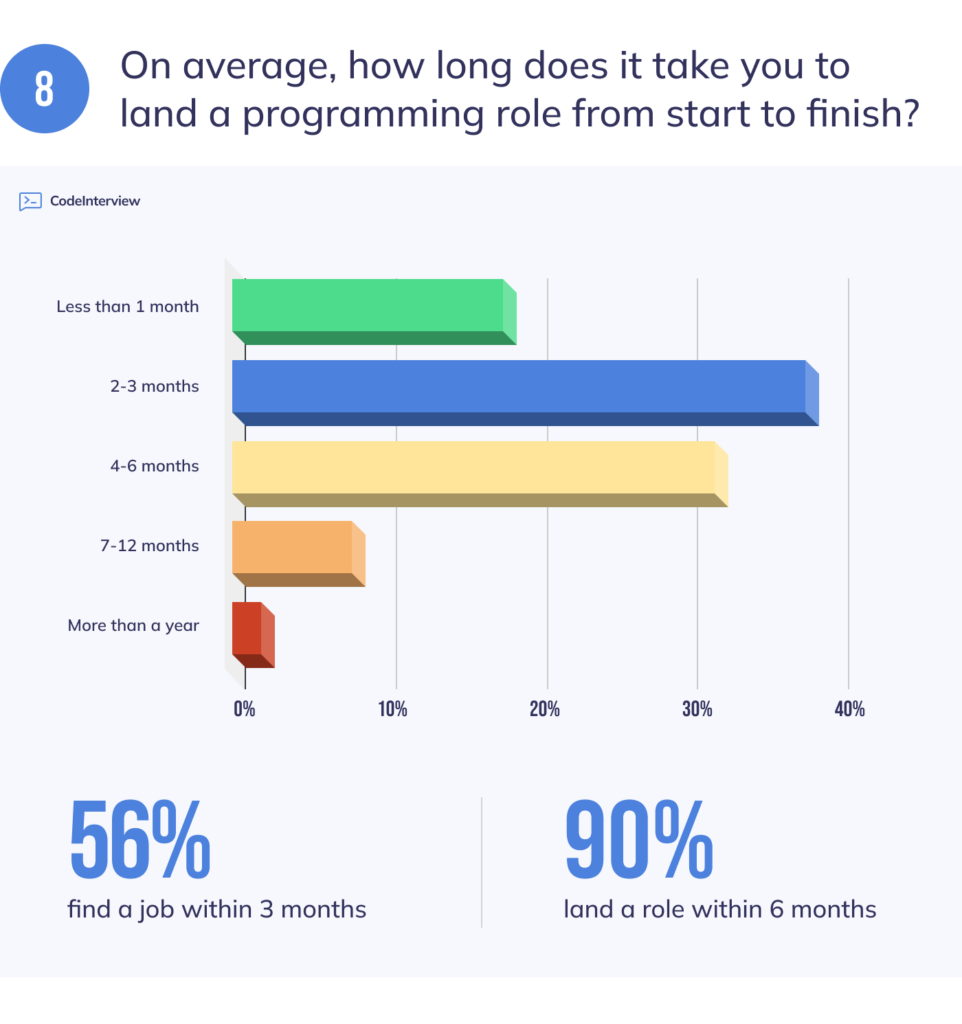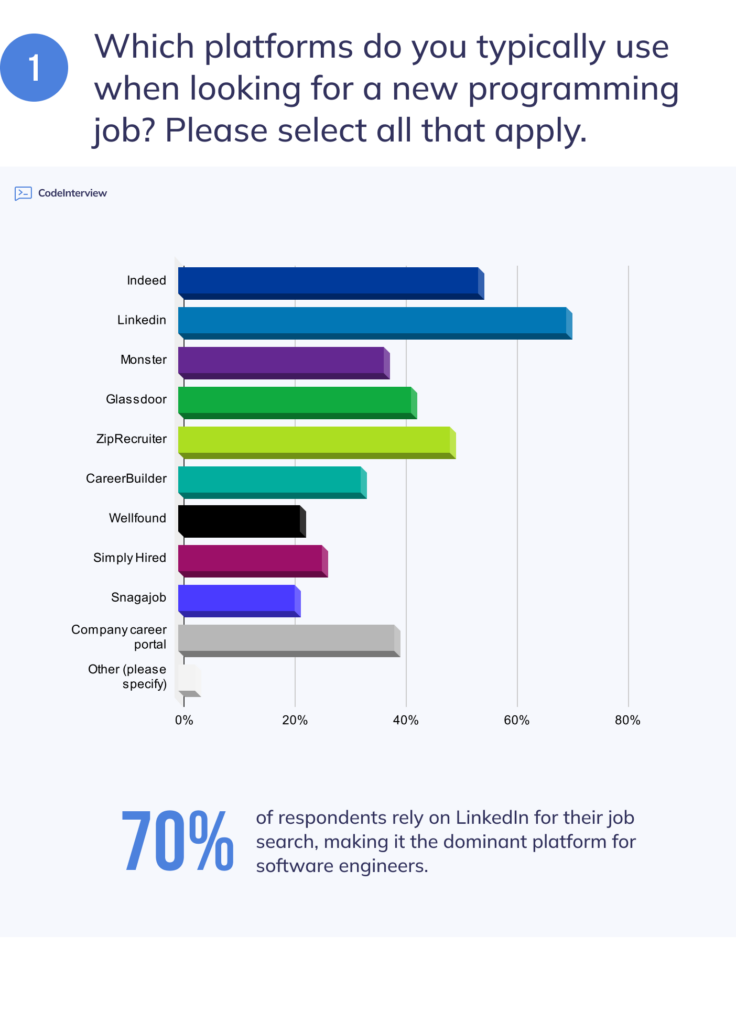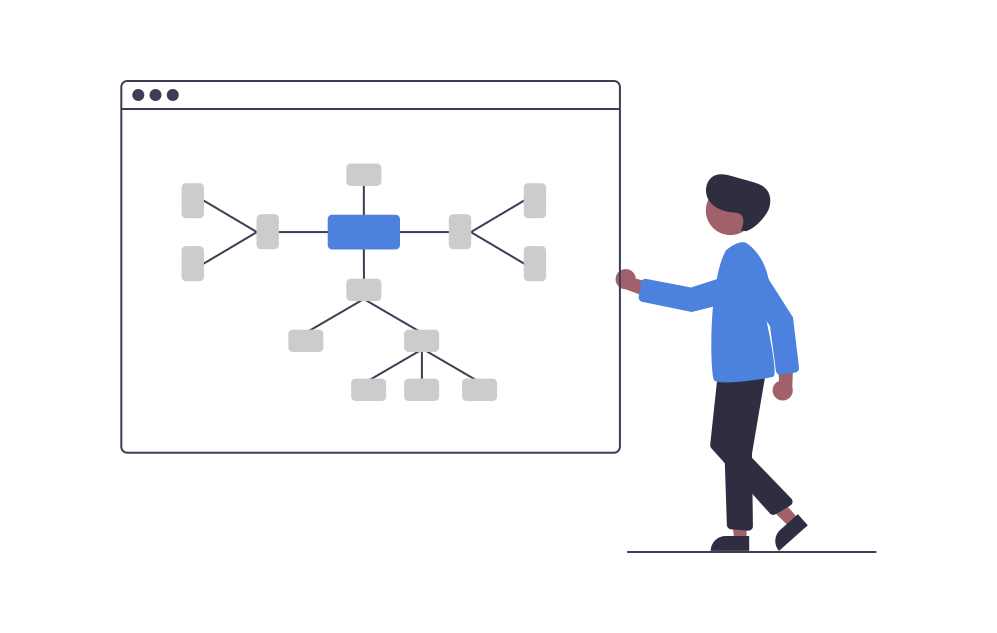Despite tech layoffs and hiring freezes, experienced software engineers are still in demand.
In fact, most tech employees that were laid off in late 2022 jumped into new roles almost immediately – often with higher pay.
And a survey we conducted among 100+ software engineers showed that 90% of developers usually find a new role within 6 months of starting a job search.

As an HR leader or tech recruiter, this means you shouldn’t take your foot off the gas pedal when it comes to building and improving your employer brand. Even if your company is scaling down, this may be a good time to revitalize your employer branding strategy without being overwhelmed with recruiting tasks.
In this article, we’ll summarize our findings from the survey above to help you strengthen your employer brand. If you want to learn what’s important to software engineers in 2023 and how to position your company in this talent landscape, read on.
What to emphasize in your candidate comms
We asked our survey participants about the attributes they value the most when applying for a programming role with a new employer.
Unsurprisingly, 62% of respondents ranked Salary & benefits as very important. This highlights the need to share salary ranges upfront to avoid wasting time on both ends.
The next most influential factor was work-life balance with 57% of respondents ranking it as very important. Developers are particularly responsive to flexible hours and remote work so they can control their schedule as much as possible.
Job security came in third with 48% which is in line with expectations given recent events in the tech world. If possible, highlight the reasons why your company is a stable employer that can provide long-term opportunities for candidates.
Which benefits and perks you should include to attract developers
We also asked which are the most important perks and benefits developers look for.
At the top, 41.5% of our respondents ranked Health insurance as an essential perk they require in a new programming job.
Interestingly, remote work is in second place with 37.7% of respondents ranking it as an essential requirement.
This leaves a 401k scheme behind remote work – with 36.8% of our respondents ranking it as essential.
So a mix of traditional benefits and remote work options are likely to put you in a good position, especially if your base salary package is not on par with the highest in the industry.
Which platforms to focus on when building your employer brand
Our survey showed that LinkedIn is the most popular job search platform for software engineers, with 69% of respondents relying on the site when looking for a new programming job.

LinkedIn comes with a suite of other features to build your employer brand, such as company pages and advertising, so it’s a leading choice if you want to attract good developers.
Glassdoor is another platform with multiple tools to improve your employer brand, used by 43% of our respondents for finding a new job. Creating a program for existing employees to regularly leave reviews is a great way to boost your position on Glassdoor.
Your company career portal is also important, with 39% of respondents going directly to an employer’s website to browse new opportunities. Make sure that the design, content and overall experience are top-notch, reviewing and improving these on a regular basis.
Which company information channels you should focus on
We asked our survey participants about the sources of information they trust the most when researching a potential employer.
What came out on top are conversations with current employees, with 38.7% ranking this as a very trustworthy source of information.
Talking to internal/external recruiters and hiring managers came in second with 31% of respondents, on par with Glassdoor reviews which also got 31%.
This highlights the need to build your employer brand internally, not just externally. A great company culture and positive environment will naturally lead to engaged applicants that are enthusiastic about getting on board.
On the other hand, more than 10% of our respondents said information in the media is not a trustworthy source of information on a potential employer so heavy investments in PR are not likely the best use of resources.

What to avoid that may hurt your employer brand
Now that we’ve had a look at some best practices based on our survey, let’s look at things to avoid that could damage your employer brand.
Communication channels
We asked our respondents about the preferred way to connect with them about new opportunities.
Email came out on top with 38.7% ranking it as a preferred way to be contacted, while 15% said they do not want to be contacted by phone. This means that sticking to email and LinkedIn are likely the best way to connect with candidates about new opportunities.
Aspects of company culture
We also asked about the reasons why they would consider switching to a new role or employer.
Having bad managers is the top reason why people would consider leaving, with 59.4% of our respondents saying they are very likely to consider a switch in this situation.
A toxic work environment came in second with 55.2% while overworking and micromanagement split 3rd and 4th place with 42.4%.
These factors highlight the need to work on company culture first before focusing on external factors that influence your employer brand.

Salary negotiations
In general, there is room to negotiate salaries with software engineers. For most people, a hard negotiation process is not a deal breaker but it will impact their view of your employer brand.
For 25% of our respondents, a long and difficult negotiation process will lead to a negative perception of your employer brand so you should carefully approach this and clear up salary ranges as early as possible.
Further reading:
